- Home
- Conn Iggulden
Empire of Silver c-4 Page 28
Empire of Silver c-4 Read online
Page 28
'Do not set my city on fire while I am gone,' he said gruffly.
She smiled at his tone.
'I cannot promise, but I'll try,' Torogene replied. She reached out and touched his foot in the stirrup, holding it hard enough for him to feel the pressure. He did not need to speak the love he felt for her; he just reached down and touched her cheek before digging in his heels and clattering through the gate.
Sorhatani's sons came with him. Kublai held the reins of three packhorses, laden high with supplies. Ogedai watched as the young man clucked to them, so full of life that it was almost painful to see. He had not told Kublai his memories of Tolui's death. He was not yet ready to tell that story, with all the pain that continued to that cold day.
It took half the morning to reach the river. His stamina had melted away over so many months of inactivity. His arms and legs were leaden by the time he dismounted and he had to struggle not to cry out as his thighs cramped. He could already hear the rippling cracks across the valley and in the distance smoke hung like morning mist. The air had the tinge of sulphurous bitterness he remembered from the Sung border. To his surprise, he found it almost pleasant to breathe in the exotic scent.
Sorhatani and her sons made camp around him, setting up a small ger on dry ground by the bank and starting tea on the stove. While it brewed, Ogedai mounted once again. He clicked his tongue to catch Kublai's attention and the young man leapt into his saddle to join him, his face bright with excitement.
Together, both men rode across a sunlit field to where Khasar readied the ordnance crews for inspection. Ogedai could see the old general's pride in the new weapons from a distance. He too had been on the Sung border and seen their destructive potential. Ogedai rode up slowly. He felt no sense of urgency or hurry. His glimpse at the greater night had given him a long perspective. It was just harder to care about the smaller things. Having Kublai with him was a reminder that not everyone shared his long view. The sight of the polished bronze guns had Kublai practically sweating.
Ogedai suffered through the formalities with his uncle. He declined the invitation of tea and food and finally gestured for the gunners to begin.
'You might want to dismount and hold your horse, my lord khan,' Khasar said.
He looked thin and weary, but his eyes were bright in his enthusiasm. Ogedai wasn't touched by uncle's mood. His legs felt weak and he did not want to stumble in front of such men. He took a moment to remind himself that he was in the eye of the nation once again. One slip and his weakness would reach every ear.
'My horse was at the Sung border,' he replied. 'He will not bolt. Kublai? You should do as he says.'
'Very well, my lord,' Khasar said formally. He clasped his hands behind his back as he gestured sharply to the gunnery teams. They stood in groups of four, carrying sacks of black powder as well as a range of odd-looking equipment. Kublai drank it all in, fascinated.
'Show me,' Ogedai said to them.
Khasar snapped orders and Ogedai watched from the saddle as the first team checked their weapon had blocks against the massive, studded wheels. A warrior placed a reed in a hole in the tube, then lit a taper from a lamp. When the taper touched the reed, there was a spark, then an explosion that sent the cannon rocking back. The blocks barely held it and the weapon leapt and crashed back down. Ogedai did not see the ball that came flying out, but he nodded, deliberately calm. His horse flicked up its ears, but then bent to crop at the grass. Kublai had to slap his gelding on the face, shocking it out of panic. The young man snarled at the animal. He would not be shamed by seeing his horse break free and run in front of the khan. However, he was more than thankful he was not in the saddle.
'Fire the rest together,' Ogedai said.
Khasar nodded proudly and eight other teams inserted their reeds into the touch-holes and lit tapers.
'On my mark, gunners. Ready? Fire!'
The crash was extraordinary. The teams had practised outside the city for weeks and the guns fired almost together, with only a slight delay. This time, Ogedai saw blurs vanishing across the valley, one or two skipping along the ground. He smiled at the thought of a line of horses or men in the path of such weapons.
'Excellent,' he said.
Khasar heard and chuckled, still delighted at controlling thunder.
Ogedai's gaze drifted to the lines of heavy catapults beyond the guns. They could launch barrels of gunpowder for hundreds of feet. His engineers had learned from the Chin, but they had improved the powder, so that it burned faster and more fiercely. Ogedai did not understand the process, nor care. What mattered was that the weapons worked.
More men waited by the catapults, standing perfectly at attention. Ogedai suddenly realised that he did not feel tired. The explosions and bitter smoke had invigorated him. Perhaps because of that, he noticed how Khasar's shoulders had slumped. The older man wore his exhaustion for all to see.
'Are you ill, uncle?' he said.
Khasar shrugged with a wince. 'I have lumps in my shoulders. The things make it hard to move my arm, that's all.'
His yellow complexion gave the lie to his words and Ogedai frowned as his uncle went on.
'The shamans say I should have them cut out, but I won't let those butchers have me, not yet. Half the men they cut don't walk out again, maybe more.'
'You should,' Ogedai said softly. 'I don't want to lose you yet, uncle.'
Khasar snorted. 'I'm like the hills, boy. A few lumps won't stop me.'
Ogedai smiled.
'I hope not. Show me more, uncle,' he said. When Ogedai and Kublai returned to the small camp by the river, the morning was almost over and the tea was long past stewed and undrinkable. The gunnery went on behind them, using vast stocks of the powder to train the men who would play a vital role in future battles. Khasar could be seen striding up and down the lines, in his element.
Sorhatani saw that her son's flushed face was smudged with soot. Both the khan and Kublai reeked of sulphurous fumes and Arik-Boke and Hulegu could only look on with transparent envy. Sorhatani left her sons to make fresh tea and walked over to where Ogedai had dismounted.
He stood at the river's edge and stared over it, shading his eyes against the sun. The noise of the waterfall hid Sorhatani's steps as she came up behind him.
'Kublai is chattering like a bird,' she said. 'I take it the demonstration went well.'
Ogedai shrugged. 'Better than I had hoped. With the new powder mix, Khasar is convinced our guns have the range of the Sung cannon.' He clenched his fist at the thought, his expression fierce. 'That will make a difference, Sorhatani. We will surprise them one day. I only wish I could get some of them out to Tsubodai, but it would take years to drag those heavy things so far.'
'You are getting stronger,' she said, smiling.
'It's the wine,' he replied.
Sorhatani laughed. 'It's not the wine, you great drunkard, it's morning rides like this one and bow work each afternoon. You already look a different man from the one I found in that cold room.' She paused, tilting her head.
'There's a little more meat on you as well. Having Torogene back is good for you, I think.'
Ogedai smiled, but the excitement of the great guns was fading and his heart wasn't in it. He sometimes thought of his fears as a dark cloth that draped itself over him, choking off his breath. He had died on that campaign, and though the sun shone and his heart still beat in his chest, it was hard to go on with each day. He had thought Tolui's sacrifice might have given him fresh purpose, but instead he felt the loss as another burden, one too great to bear. The cloth still clung to him, for all Sorhatani had done. He could hardly explain it and part of him wished the woman would leave him alone to find a quiet path onwards.
Under Sorhatani's watchful gaze, Ogedai sat with the family, drank the tea and ate the cold food they had brought. No one brought him wine, so he rummaged for a skin of it in the packs, drinking straight from the teat, like airag. He ignored Sorhatani's expression as the red liquid brought a gl
ow back to his cheeks. Her eyes seemed made of flint, so he spoke to distract her.
'Your son Mongke is doing well,' he said. 'I have reports from Tsubodai that speak highly of him.'
The other sons sat up in sudden interest and Ogedai wiped his lips, tasting the wine. It seemed bitter that day, sour on the tongue as if there was no goodness in it. To his surprise, it was Kublai who spoke, his tone respectful.
'My lord khan, have they taken Kiev?'
'They have. Your brother was part of the battles around that city.'
Kublai seemed to be struggling with impatience.
'Are they at the Carpathian mountains yet then? Do you know if they will breach them this winter?'
'You will tire the khan with your chatter,' Sorhatani said, but Ogedai noticed she still looked for an answer.
'The last I heard, they are going to try and cross before next year,' he said.
'That's a hard range,' Kublai murmured to himself.
Ogedai wondered how a young man could presume to know anything of mountains four thousand miles away. The world had grown since he was a boy. With the chains of scouts and way stations, knowledge of the world was flooding into Karakorum. The khan's library already contained volumes in Greek and Latin, full of wonders he could hardly believe. His uncle Temuge had taken the task of building its reputation seriously, paying fortunes for the rarest books and scrolls. It would be the work of a generation to translate them into civilised languages, but Temuge had a dozen Christian monks working on the task. Lost in a reverie, Ogedai dragged himself back and considered the words that had led him to drift away in thought. He wondered if Kublai was worried for his brother's safety.
'With Baidur, Tsubodai has seven tumans and forty thousand conscripts,' he said. 'The mountains will not stop them.'
'And after the mountains, my lord?' Kublai swallowed, trying not to irritate the most powerful man in the nation. 'Mongke says they will ride all the way to the sea.'
The younger brothers hung on his response and Ogedai sighed. He supposed distant battles were exciting compared to a life of study and quiet in Karakorum. Sorhatani's sons would not stay in the nest of stone for long, he could see.
'My orders are to secure the west, to give us a border without enemies clamouring beyond it to invade our lands. How Tsubodai chooses to do that is up to him. Perhaps in a year or two you will travel out to him. Would you like that?'
'Yes. Mongke is my brother,' Kublai replied seriously. 'And I would like to see more of the world than just maps in books.'
Ogedai chuckled. He could remember when the world seemed limitless and he had wanted to see it all. Somehow, he had lost that terrible hunger and for a moment he wondered if it was Karakorum that had taken it from him. Perhaps that was the curse of cities, that they rooted nations in one place and made them blind. It was not a pleasant thought.
'I would like to have a private word with your mother,' he said, realising he would not have a better moment that day.
Kublai moved fastest, shepherding his brothers to their horses and taking them in the direction of Khasar's gun teams, still practising in the afternoon sun.
Sorhatani sat down on the mat of felt, her expression curious.
'If you are going to declare your love for me, Torogene told me what to say,' she said.
To her pleasure, he laughed aloud. 'I'm sure she has, but no, you are safe from me, Sorhatani.' He hesitated and she leaned closer, surprised to see a touch of pink come to his cheeks.
'You are still a young woman, Sorhatani,' he began.
She shut her mouth rather than reply, though her eyes sparkled. Ogedai began twice more, but stopped himself.
'We have established my youth, I think,' she said.
'You have your husband's titles,' he went on.
Sorhatani's light mood dropped away. The one man who could remove the extraordinary authority she had been given was nervously trying to say what was on his mind. She spoke again, her voice harder.
'Earned by his sacrifice and death, my lord, yes. Earned, not given as a favour.'
Ogedai blinked, then shook his head.
'They too are safe, Sorhatani,' he said. 'My word is iron and you have those things from my hand. I will not take them back.'
'Then what is sticking in your throat so that it chokes you to say it?'
Ogedai took a deep breath. 'You should marry again,' he said.
'My lord khan, Torogene told me to remind you…'
'Not to me, woman! I've told you before. To my son. To Guyuk.'
Sorhatani looked at him in stunned silence. Guyuk was the heir to the khanate. She knew Ogedai too well to think the offer was made in haste. Her mind whirled as she tried to see through to what he truly wanted. Torogene must have known the offer would be made. Ogedai would never have thought of it on his own.
The khan turned away from her, giving her time. As he stared into the middle distance, the cynical part of Sorhatani wondered if this was a way to bring her husband's vast holdings back into the khanate. At a stroke, marriage to Guyuk would reverse the rashness of Ogedai's offer to Tolui. The effects of that unique decision were still rippling out and she did not know where it would end. The original lands of Genghis Khan were ruled by a woman and she had still barely come to terms with it.
She thought of her own sons. Guyuk was older than Mongke, but not by many years. Would her sons inherit, or would their birthright be stolen from them in such a union of families? She shuddered and hoped Ogedai had not seen. He was the khan and he could order her to marry, just as he had given her the titles of her husband. His power was near absolute over her, if he chose to use it. She looked at him without turning her head, weighing up the man she had nursed through fits and darkness so strong that she had thought he would never return. His life was as fragile as porcelain, yet he still ruled and his word was iron.
She could sense his patience was unravelling. A small muscle fluttered in his neck and she stared at it, searching for words.
'You do me great honour with such an offer, Ogedai. Your son and heir…'
'Then you accept?' he said curtly. His eyes knew the answer from her tone and he shook his head in irritation.
'I cannot,' Sorhatani replied softly. 'My grief for Tolui is the same. I will not marry again, my lord khan. My life now is my sons and no more than that. I want no more than that.'
Ogedai grimaced and the silence came back between them. Sorhatani feared his next words would be to command her, ignoring her will. If he spoke the words, she would have no choice but to obey. To resist would be to throw the bones with the futures of her sons, to see them stripped of authority and power before they had even learned to use it. She had wiped the khan's skin when he had soiled himself unknowing. She had fed him from her own hand when he moaned for peace and death. Yet he was the son of his father. The fate of one wife, one woman, would mean little to him and she did not know what he would say. Keeping silent, she waited with her head bowed, the breeze blowing between them.
It took an age, but at the last, he nodded to himself.
'Very well, Sorhatani. I owe you your freedom, if that is your wish. I will not demand your obedience in this. I have not told Guyuk. Only Torogene knows it was even a thought.'
Relief flooded through Sorhatani. On instinct, she prostrated herself on the grass, placing her head by his foot.
'Oh, get up,' he said. 'A less humble woman I have never met.'
CHAPTER TWENTY-FOUR
Kachiun died in the mountains, above the snowline, where there was neither time nor strength to tend to his body. The general's flesh had swollen with the poison from his infected leg. His last days had been spent in delirious agony, his hands and face mottled with sickness. He had died hard.
The winter had struck early just days afterwards, with blizzards howling through the mountains. Heavy snow blocked the narrow passes Guyuk had scouted through to the plains below. The only blessing of the plummeting temperatures was that it kept the dead from rotting.
Tsubodai had ordered Kachiun's body wrapped in cloth and bound to a cart. The brother of Genghis had expressed a wish to be burnt in death, rather than sky-buried, laid out for birds and animals in high crags. The Chin ritual of cremation was becoming more popular. Those of the nation who had become Christian were even buried, though they preferred to go into the ground with the hearts of enemies in their hands, servants for the next life. Neither Tsubodai nor Ogedai laid down the law on any of the practices. The people of the nation made their own choices at a time that could hurt no one else.
There was no single peak to the Carpathians, but dozens of valleys and ridges to be traversed. At first they were the only presence apart from distant birds, but then they came upon the first of the frozen bodies, high up, where the air was painful in the lungs. It lay alone, the hands and face wind-seared to black, almost as if charred by fire. Snow half-covered the man, and one of the minghaan officers set his warriors to dig at similar humps of snow. There were more bodies, the faces dark or pale, Turkic or Russian, often bearded. Men lay with women, their children frozen between them. They were preserved on the heights, their bodies thin, their flesh made stone for ever.
In all, there were hundreds and the generals could only wonder who they had been, or why they had chosen to risk death in the mountains. The bodies did not look old, but there was no way to tell. They could have lain there for centuries, or starved just months before the Mongols came loping along the tracks after them.
The wind and snow of winter came like a new world. From the first flakes, the animal paths vanished and the drifts built and built, having to be dug out at every step. Only the links between scouts at every pass and the sheer numbers and discipline of the tumans saved them. Tsubodai could relieve those at the front, who had to push through with hands and shovels. Those behind walked a wide trail of brown slush, churned up by tens of thousands of trudging feet and hooves. The snows could not stop them. They had already come too far.

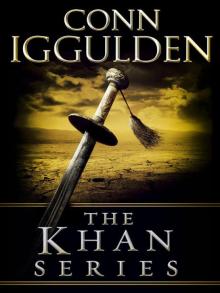 The Khan Series 5-Book Bundle
The Khan Series 5-Book Bundle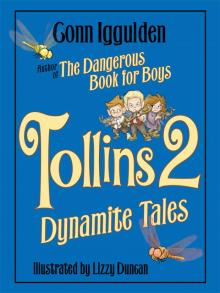 Tollins 2: Dynamite Tales
Tollins 2: Dynamite Tales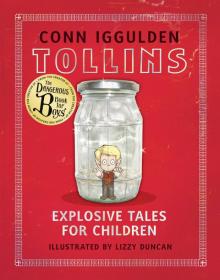 Tollins: Explosive Tales for Children
Tollins: Explosive Tales for Children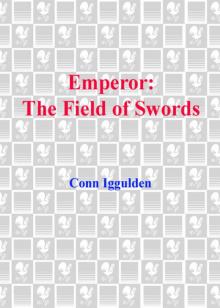 The Field of Swords
The Field of Swords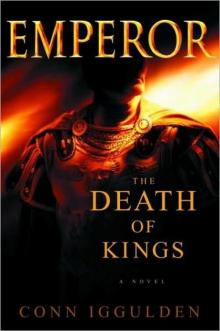 The Death of Kings
The Death of Kings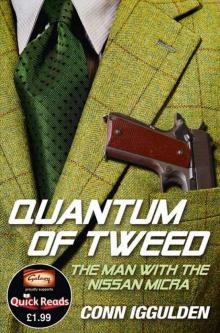 Quantum of Tweed: The Man With the Nissan Micra
Quantum of Tweed: The Man With the Nissan Micra Bones of the Hills
Bones of the Hills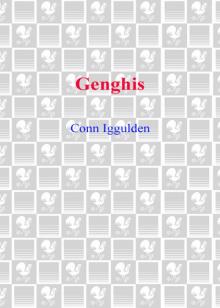 Genghis: Birth of an Empire
Genghis: Birth of an Empire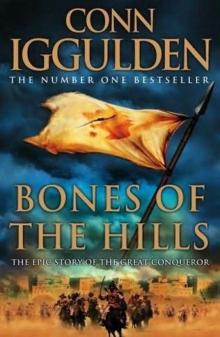 The Gates of Rome
The Gates of Rome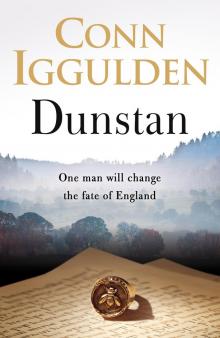 Dunstan
Dunstan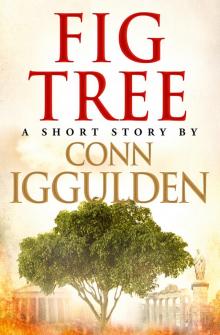 Fig Tree
Fig Tree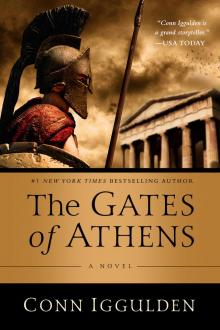 The Gates of Athens
The Gates of Athens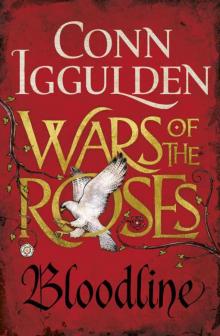 Stormbird
Stormbird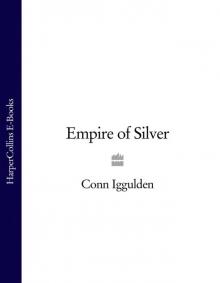 Khan: Empire of Silver
Khan: Empire of Silver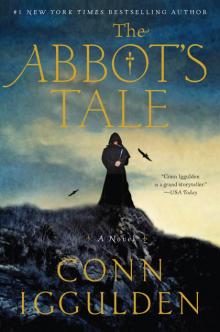 The Abbot's Tale
The Abbot's Tale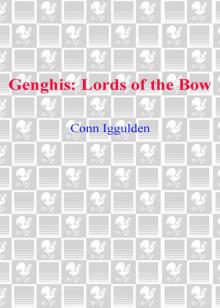 Gengis: Lords of the Bow
Gengis: Lords of the Bow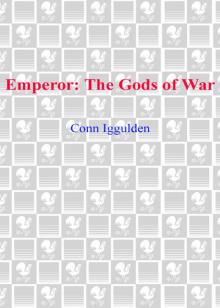 The Gods of War
The Gods of War Blackwater
Blackwater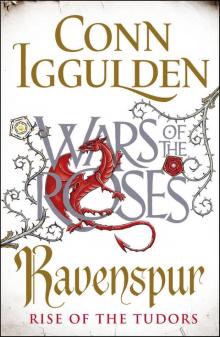 Ravenspur: Rise of the Tudors
Ravenspur: Rise of the Tudors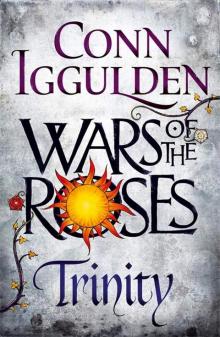 Wars of the Roses: Trinity (War of the Roses Book 2)
Wars of the Roses: Trinity (War of the Roses Book 2)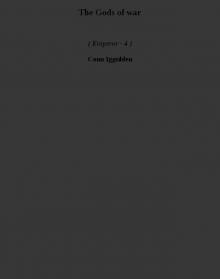 The Gods of war e-4
The Gods of war e-4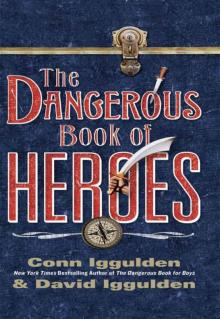 The Dangerous Book of Heroes
The Dangerous Book of Heroes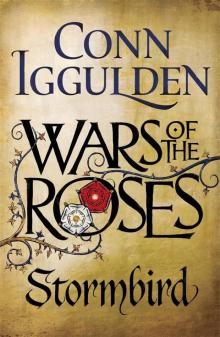 Stormbird wotr-1
Stormbird wotr-1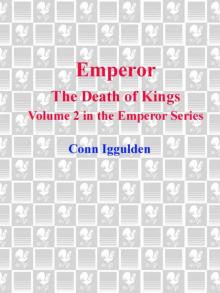 Emperor: The Death of Kings
Emperor: The Death of Kings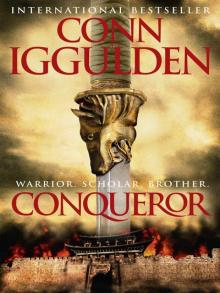 Conqueror (2011) c-5
Conqueror (2011) c-5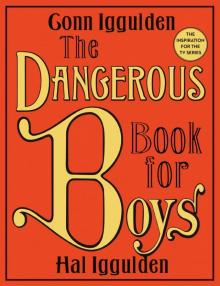 The Dangerous Book for Boys
The Dangerous Book for Boys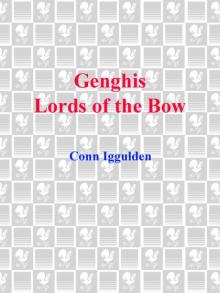 Genghis Lords of the Bow
Genghis Lords of the Bow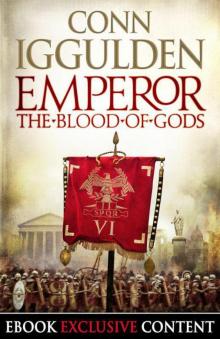 Emperor: The Blood of Gods (Special Edition) (Emperor Series, Book 5)
Emperor: The Blood of Gods (Special Edition) (Emperor Series, Book 5)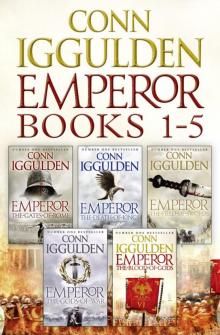 The Emperor Series: Books 1-5
The Emperor Series: Books 1-5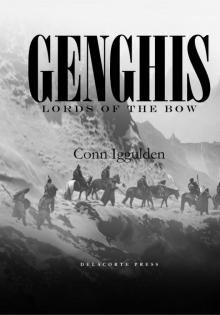 Lords of the Bow c-2
Lords of the Bow c-2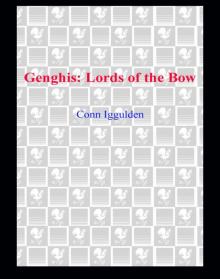 Lords of the Bow
Lords of the Bow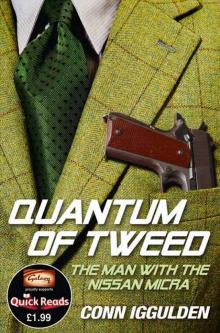 Quantum of Tweed
Quantum of Tweed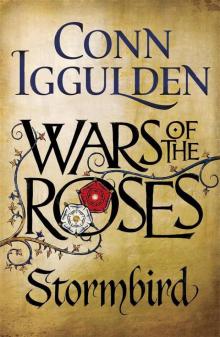 Wars of the Roses 01 - Stormbird
Wars of the Roses 01 - Stormbird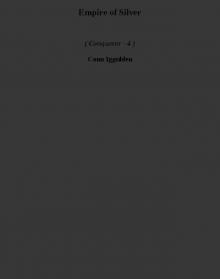 Empire of Silver c-4
Empire of Silver c-4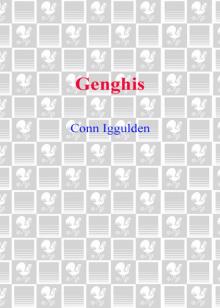 Birth of an Empire
Birth of an Empire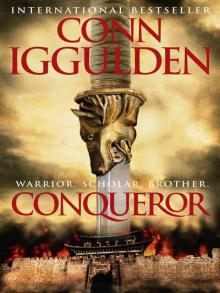 Conqueror (2011)
Conqueror (2011)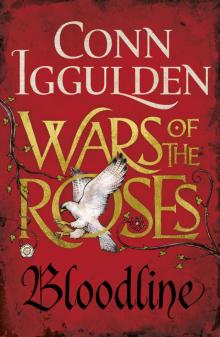 Wars of the Roses: Bloodline: Book 3 (The Wars of the Roses)
Wars of the Roses: Bloodline: Book 3 (The Wars of the Roses) Bones Of the Hills c-3
Bones Of the Hills c-3 Empire of Silver
Empire of Silver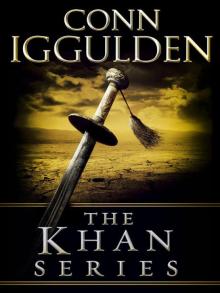 The Khan Series 5-Book Bundle: Genghis: Birth of an Empire, Genghis: Bones of the Hills, Genghis: Lords of the Bow, Khan: Empire of Silver, Conqueror
The Khan Series 5-Book Bundle: Genghis: Birth of an Empire, Genghis: Bones of the Hills, Genghis: Lords of the Bow, Khan: Empire of Silver, Conqueror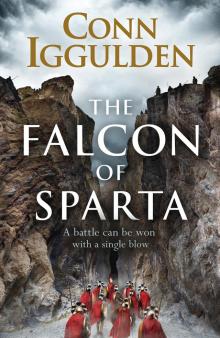 The Falcon of Sparta
The Falcon of Sparta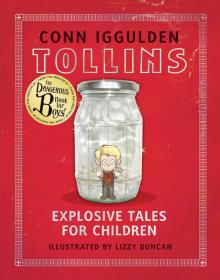 Explosive Tales for Children
Explosive Tales for Children